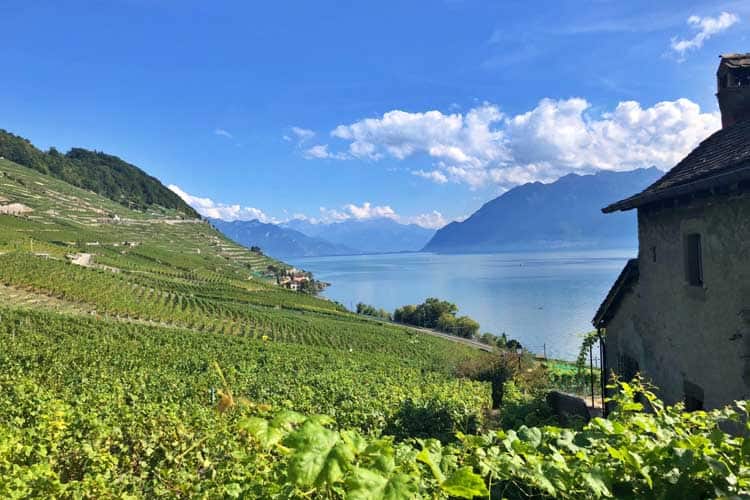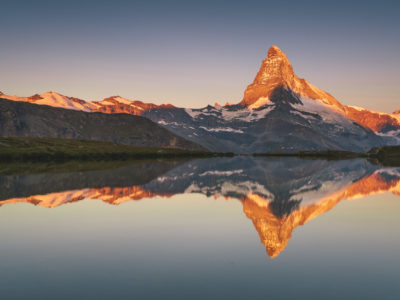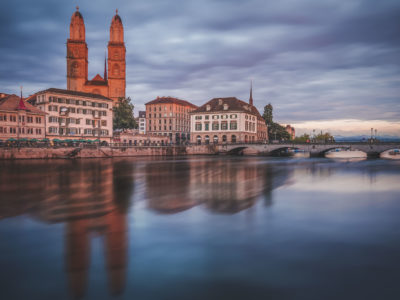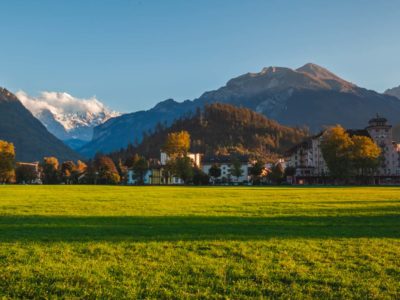Tick tock, don’t be late! Switzerland is known far and wide as being expensive, a mecca for offshore banking and stickler for punctuality.
But this small country is so much more than that – with towns seemingly frozen in time, picturesque landscapes that take your breath away and a population of warm and friendly people always eager to help, Switzerland is quickly becoming a must-see European destination.
This Switzerland travel guide will help you plan your next vacation.
Table of contents
Table of Contents
Fast Facts about Switzerland
- Swiss power voltage is 230 V 50 Hz; Power sockets C & J
- The local currency is the Swiss Franc (CHF) and is around 1 CHF to 1 USD
- The Swiss high speed rail system is one of a kind and connects all major Swiss cities, so don’t bother renting a car or flying between cities. Make sure to download the SBB app for your iPhone or Android device so as to have everything from train schedules, trip planning and mobile tickets for boarding right at your fingertips. But make sure not to get lost!
- The four national languages of Switzerland are German, French, Italian and Romansh
- Most businesses still close for lunch in Switzerland, generally from noon/12:30 to 1:30 or 2 – but this is changing, especially in larger cities. Many businesses are closed on Sundays while museums are generally closed on Mondays. If you are in need of a dire shopping fix, then make your way to the main train stations, like Zurich, Basel or Bern, which have attached shopping centres where shops (including grocery shops) remain open on Sunday.
Things to See and Do in Switzerland
- Cycle through the Alps on a Mountain Bike – Don’t break a sweat, instead climb hills, whizz along on straightaways and glide through single lane roads on these crafty little electric bikes.
- Downhill Trotti Bike – from 2000 meters above sea level, board your trotti bike and race down a Swiss mountain on a 40 minute journey to the village of Grindelwald.
- Find yourself clipped into steel cables as you climb trees, walk over dangling obstacles, balance on beams, jump on swings and surf over a span of open air at the High Rope Park at Gantrisch.
- See Matterhorn – Switzerland offers the best skiing in the world and the Matterhorn is the crème de la crème. Snow is guaranteed 365 days a year, meaning that travellers can ski, snowboard, hike or snowshoe around the Matterhorn whenever they please. Or hike the iconic 5 Lakes Hike Zermatt – Incredible Matterhorn Views
- Climb a Via Ferrata – known as the iron route, via ferratas date back centuries and helped connect mountain routes. Ladders, cable bridges and wooden steps are attached to the side of mountains where brave souls climb routes daring not to look down as they tightrope across deep valleys.
- Learn about cheesemaking – Visit Gruyères to see how Switzerland makes this famous cheese and to try some yourself after.
- Château Chillon – This may be the most scenic castle in Switzerland, as it’s set on a small island.
- Visit Europe’s Biggest Waterfall – Feel the roar and vibration of the rapidly falling waters of the Rhine Falls. Follow the adventure path which goes from Laufen Castle to the outlook platforms, allowing for an unobstructed view of this spectacle of nature or opt to take a boat ride into the Rhine Falls basin. Finish off your day at the Adventure Park on the north bank where you can glide from rope to rope with the Rhine Falls as your backdrop.
- Explore Bern – Bern, Switzerland is a UNESCO World Heritage Site and the political centre of Switzerland. It doesn’t feel like a political hub though, this city was made for walking. The walkways of Bern are all covered making for pleasant shopping in any type of weather.
Switzerland Travel Guides
Budgeting
Accommodation
Budget – You can find budget hotels in Switzerland starting at 50 euros. They may come with shared or private rooms, free Wi-Fi, and a small breakfast buffet.
Mid Range – Mid-range hotels start around 90 euros and may include a pool, free parking, and a lounge.
High End – Luxury hotels begin at 200 euros per night and can include a rooftop terrace, fitness center, and spa.
Check out our favorite booking platforms Booking.com, Tripadvisor and VRBO for the best deals on accommodation in Switzerland.
Food
- Fondue – One of the most well-known Swiss foods is fondue, which is melted cheese with cubed bread.
- Birchermüesli – This specialty has apples, hazelnuts, lemon juice, oat flakes, and condensed milk in it.
- Rösti – This hot cake is made of potatoes and cooked in fat or butter.
- Chocolate – It wouldn’t be a trip to Switzerland without trying some of their chocolate, particularly the milk chocolate.
The Best Ways to Get Around Switzerland
Getting to Switzerland:
Flights: You can fly direct to Switzerland from cities in the United States such as New York. There are also numerous flights around Europe and Asia that fly direct to Switzerland.
You can check for the best flights to Switzerland on Skyscanner.
Transportation:
Switzerland has a very efficient train system and there really is no reason to travel any other way. Swiss Rail goes everywhere regularly. It is fast, comfortable, safe and always on time.
Buses: Buses run all over the country and start at 2.60 CHF.
Taxis/Uber: Taxies start at a base price of 6 francs with an added 3.80 francs per kilometer.
Car Rental: Car rentals start at 20 euros per day.
You can also compare prices here.
When to go To Switzerland
The best time to visit Switzerland depends on what activities you want to do when you’re there. The country has some amazing skiing, which you’ll want to visit from December to March to take advantage of.
However, if you want to spend your time hiking in the famous Swiss Alps, April through June or September through October may be best. You’ll get dry weather for the most part, but it won’t be as crowded as the summer.
Where to Stay in Switzerland
- Hôtel Royal – This luxury hotel in Geneva is close to the train station and has room services available 24 hours a day. The hotel also offers rooms with whirlpool tubs, kitchens, and 2 French restaurants.
- Residence Mutschellen – This Zurich hotel is a great place to stay when you want an affordable room in the middle of the city. The hotel is 5 minutes away from the train station and on a street full of restaurants and shops.
- Hotel Rochat – This Basel hotel is both kid and pet-friendly. They also offer laundry service, free Wi-Fi, and breakfast.
Switzerland Guides
What to Pack for Switzerland
The weather in Switzerland varies greatly between different places, so be prepared for a range of temperatures as the mountains create a variety of local and regional microclimates.
Most of the country has a central European climate with the coldest area being in the Jura (particularly the Brevine Valley) while the hottest being in Ticino (south), which has a Mediterranean climate. If snow-sports are your thing, the Alpine resort season stars around mid-December and closes down again once the snow starts to melt, which is around mid-April.
- Forget the umbrella – in cities like Zurich, where the wind is strong, make sure to pack a warm waterproof jacket to fill the role of an umbrella
- Footwear – Pack a pair of lightweight, durable and comfortable shoes. Known for its outside activities, including breathtaking hiking trails in the Swiss countryside, travellers eager to hike should pack a pair of hiking boots or trainers.
- Bring a water bottle – city water foundations provide an excellent, clean and cheap water supply – they can be easily found in all major cities.
- Layers – When traveling to different climates remember that layering is the key to effortlessly transition from cold to hot climates or vice versa.
- Read more at Packing for Europe – Tips That Will Make Your Travel Life Easier
See our packing tips: packing tips
Switzerland Travel Guide: Best Booking Resources
Whenever we travel to we make sure to start with these companies. We have tried a lot of different ones over the years and all of these have consistently proven to be the best when it comes to offering great prices.
We have used every one of these personally and continue to do so.
- Booking.com: This is our go site to when comparing prices for accommodation. It usually has the cheapest prices, especially in Europe and we love their interface. Not to mention you get free cancellation and you are guaranteed the best price.
- Trip Advisor: What we like about Trip Advisor is that we can look at all the reviews and then book our accommodation. TripAdvisor is where we go when we want to compare prices with multiple accommodation providers.
- VRBO: is the main search engine we use when we are looking for a home or apartment rental. It can sometimes be cheaper than hotels and it is the best way to stay in areas that offer a more local feel.
- Hostelworld: With one of the largest databases of hostels in the world, Hostelworld is the go-to site when you are looking for budget accommodation.
- Skyscanner: This is the first place we check for flights. It consistently comes back with the cheapest and best options. It allows us to compare a lot of airlines to get the best price.
- Rome 2 Rio: If you want to see how to get somewhere by plane, train, bus, ferry or car Rome2Rio lays it all out for you as well as related costs.I love how they show it all to you on a Google Map and it works offline.
- Get Your Guide: For all your day trip and city guide needs, we use Get Your Guide. It has the world’s largest collection of things to do with more than 30,000 activities in 7500 destinations.
- World Nomads Insurance: When traveling to Italy you should always have travel insurance. We have found the best bang for your buck is by far World Nomads.




